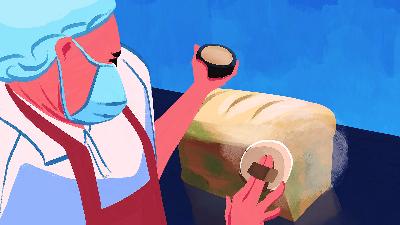BPOM’s Response on Bread with Preservative for Cosmetics
Monday, July 22, 2024
The BPOM does not approve the use of sodium dehydroacetate as a food ingredient. Emma Setyawati, acting Deputy for the Supervision of Processed Foods at BPOM explains.
arsip tempo : 174725170714.

RECENT news has surfaced about food products suspected of containing potentially harmful substances. This suspicion arose after several home food producers conducted laboratory tests on two bread brands, Aoka and Okko. The test results indicated that these breads contain sodium dehydroacetate, a chemical typically used in the cosmetic industry.
In response to these findings, acting Deputy for the Supervision of Processed Foods at the National Agency of Drug and Food Control (BPOM), Emma Setyawati, stated that the agency is currently investigating the issue. She emphasized that BPOM has not approved the use of sodium dehydroacetate in food products.
The following is an excerpt from Tempo’s interview with Emma, accompanied by BPOM’s Director of Processed Food Production Supervision, Didik Joko Pursito, via telephone on Wednesday, July 17.
What are the results of BPOM’s investigation on the levels of potentially harmful preservatives in Aoka and Okko breads?
Didik Joko Pursito: We have received information regarding test results related to the suspected presence of sodium dehydroacetate. We conducted tests to confirm whether this substance, which could act as a long-lasting preservative, is indeed present. We have conducted the tests, and the results showed that it was fine. These results came from our own laboratory.
Was the testing conducted after the news surfaced or when the producers registered their products?
Didik Joko Pursito: What is available in the free market must be monitored randomly. From the sampling mechanism, oversight is necessary to ensure the product conforms at the time of testing and distribution can be conducted undercover and by design.
Producers in South Kalimantan have reported their laboratory test results to the local BPOM. What is your response?
They haven’t communicated with us. Announcing the test results violates laboratory ethics. If it is not published by BPOM, it’s not reliable.
Can laboratories perform tests based on requests from anyone?
No, they cannot. We perform the tests ourselves, we are the regulators. There are third parties that do the testing (in our laboratory), such as the police, the prosecutor’s office, and regional governments.
What are the results of BPOM’s laboratory tests on samples of the two bread brands?
That (the sodium dehydroacetate content) was not detected. We have tested several times, confirmed, and tested again. The results have consistently shown no detection. We conduct risk-based testing. When I say risk-based, it means it has been tested several times, and I do not have the right to report the results. We are not obligated to report the test results to Tempo.
BPOM is not curious about the existence of packaged breads with a shelf life of up to six months?
That is why sampling and post-market testing are conducted to ensure that the composition of raw materials in these products is the same as it was pre-market. We conduct sampling and testing. If you ask about our curiosity, BPOM is curious about products that have a long shelf life. But there are also aspects of production processes, cleanliness, and sanitation. If hygiene tends to be poor, there is a risk of contamination, and the shelf life may be shorter.
Does BPOM allow the use of sodium dehydroacetate in foods in certain amounts?
Currently, it is not allowed in food in Indonesia. However, its use as a food preservative is permitted in a number of countries.
What types of preservatives are permitted?
It doesn’t mean that bakery products cannot use preservatives. There are preservatives allowed for bakery products, but not sodium. It is not yet approved as an additional preservative. Other preservatives that comply with standards and limits can be used, depending on formulation factors, hygiene, and production technology. Preservatives such as benzoates and propionates are included in BPOM regulations.
Is there an obligation for producers to list their ingredients?
Yes, they must. Otherwise, there are penalties. BPOM regulations on food registration include penalties. They may not be served for three years, their production may be canceled, and so forth.











